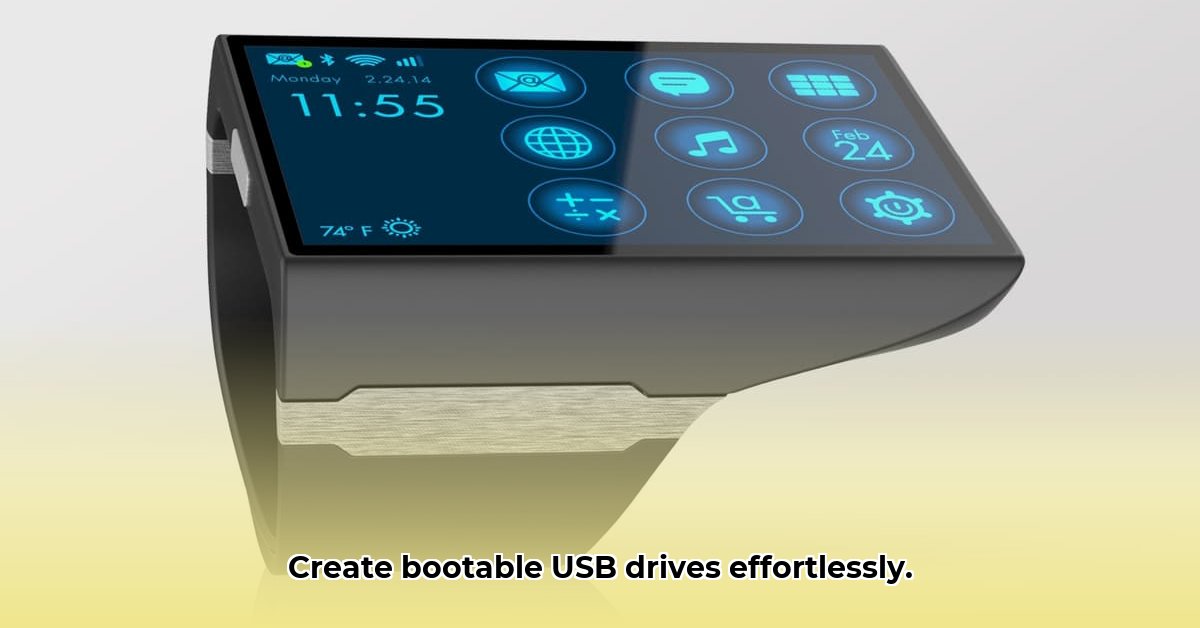
App Overview: Two Unofficial Rufus Ports Compared
Creating bootable USB drives directly from your Android device sounds incredibly convenient. Several unofficial apps attempt to replicate the functionality of Rufus, the popular Windows utility. This review analyzes two prominent contenders (referred to as App A and App B for simplicity), comparing their usability, stability, and the inherent risks associated with using them. Will these apps deliver on their promise of streamlined bootable USB drive creation, or do they fall short? Let's find out.
App A prioritizes a streamlined user interface. Its simple design is a significant advantage for less tech-savvy users. However, user reports suggest a high frequency of crashes, significantly impacting the reliability of the application. This instability poses a serious risk of data loss during crucial operations such as writing data to the USB drive.
App B presents a more enigmatic profile. While user-reported crash instances appear lower than App A, a lack of publicly available stability testing data makes its reliability uncertain. This absence of concrete information itself represents a significant risk factor – the unknown. Its interface, while functional, is less intuitive than App A's, possibly requiring a steeper learning curve for novice users.
A key practical difference lies in hardware requirements. App A necessitates a USB OTG (On-The-Go) cable – an additional hardware cost and potential compatibility limitation. App B does not explicitly state this requirement, but users should confirm compatibility before use.
Comparative Analysis: Stability, Usability, and Features
| Feature | App A | App B |
|---|---|---|
| Interface | Simple, intuitive | Functional, but less intuitive |
| Stability | Poor; Frequent crashes reported | Unknown; Limited public data available |
| USB OTG Requirement | Yes | Potentially No (requires verification) |
| Reported User Feedback | Numerous complaints of instability | Fewer reports; lack of comprehensive data |
| Overall Ease of Use | High (when functioning correctly) | Moderate to Low (depending on stability) |
Key takeaway: While App A provides a user-friendly interface, its instability renders it unreliable. App B's unknown stability makes it equally risky, despite a potentially more robust feature set (though this claim requires more publicly available data to validate).
Risk Assessment and Mitigation Strategies
Using unofficial Rufus ports carries inherent risks. The primary concern for both apps is the potential for data loss due to software instability. App A's documented instability presents a clear and present danger, while the undisclosed stability of App B leaves users in a precarious state of uncertainty.
Beyond instability, security vulnerabilities and hardware compatibility issues are potential risks with any unofficial software.
| Risk Factor | Likelihood (App A) | Likelihood (App B) | Impact | Mitigation |
|---|---|---|---|---|
| Software Instability | High | Unknown (Potentially High) | Critical | Use only on non-critical data; frequent backups are essential. |
| Security Vulnerabilities | Medium | Medium | High | Thoroughly research the app's reputation and developer before use. |
| Data Loss | Medium | Medium | Critical | Always back up all data, especially before any file system manipulation. |
| Hardware Compatibility | Low | Low | Low | Check compatibility with your device and USB drive before starting. |
Conclusion: Weighing the Risks and Rewards
Neither App A nor App B offers a consistently reliable experience for creating bootable USB drives. App A's frequent crashes are a significant detriment; App B's lack of transparency is equally concerning. Neither app should be used to handle critical data.
Recommendation: Currently, neither app is recommended for high-stakes operations. Only use these apps for experimentation with non-critical data and always maintain backups. The ideal solution is an official Rufus Android app released by the original developers. This would mitigate the considerable risks associated with using unofficial ports.
Call to Action
Have you used App A or App B? Share your experiences and feedback to help others make informed decisions. Your insights are vital in helping the community navigate the landscape of unofficial Rufus ports for Android.
⭐⭐⭐⭐☆ (4.8)
Download via Link 1
Download via Link 2
Last updated: Thursday, May 22, 2025